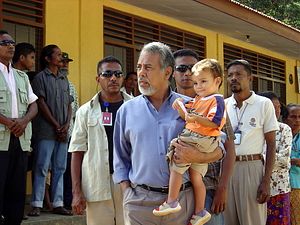More than a decade after independence and two United Nation interventions Asia’s youngest nation remains an impoverished and fragile state. For a decade Timor was the highest recipient of foreign aid in the world, in per capita terms, with Australia, Portugal and Japan footing most of the bill. While the country has since 2007 been receiving significant revenues from oil and gas, to the tune of $2 billion a year, very little has reached the common people. Meanwhile the country’s infrastructure remains one of the worst in the region, with power cuts frequent even in the capital Dili.
Unemployment is among the highest in the world, with the International Crisis Group estimating that the percentage of the available workforce that is either unemployed or informally employed is 71 percent. Nearly two thirds of the country’s population is under 30 years old creating a serious source of tension. Has of 2010 the country had the highest rate of urbanization in the world at 5 percent a year with thousands of unemployed young men moving into the capital. Slums without the minimum conditions are emerging on the foot of the mountains that encircle Dili. While luxury houses such as the one being built by the Minister of Finance Emilia Pires in Farol are being erected by a few privileged ones. Pires has been exposed on multiple occasions by leaked documents linking her to several other fraudulent episodes.
Timor is no stranger to poverty. However, the appearance of small pockets of affluence next to abject poverty is new. Child prostitution is quite common, particularly among school children. In June this year the secretary of state for gender told the media that prostitution was increasing in the country, particularly among high school children. Timorese social media is replete with allegations that several government ministers and other senior officials are involved in child prostitution.
Corruption is fast becoming endemic, with several scandals exposed in the media involving ministers and other senior officials. In 2010 Mario Carrascalao, Prime Minister Xanana Gusmão’s own deputy prime minister resigned after denouncing several corruption cases, including one involving Gusmão’s daughter Zenilda. Five Timorese ambassadors have been recalled for reasons ranging from corruption to attempted rape.
Following the July 2012 elections, former guerrilla commander Gusmão created the largest government in the Asia Pacific, with a cabinet comprising 55 members in a country with a population of just over 1 million. Not only is the government ridiculously large, but many of the ministers have murky pasts, such as minister for State Administration Jorge da Conceição Teme, who was recalled from his post as ambassador to Canberra after he became the subject of sexual harassment claims.
Not surprisingly, the state bureaucracy is in total disarray with Gusmão himself admitting that most of his numerous ministries are able to execute only about 30 percent of their budgets. Public servants go for months without pay; for the hundreds of international advisors the wait is often up to a year.
The country offers generous retirement packages for its politicians. Ministers, deputy ministers, members of parliament, judges and other senior officials are entitled to a life pension that varies from $2500 to $4000 after completing a mere five-year term. Neither the government nor the opposition has been very keen on changing the law. Millions are being spent on luxury cars, houses and trips abroad while unemployment continues to grow. So far, Gusmão has been able to keep a fragile peace by spending significant amounts on expanding patronage networks, awarding contracts and other benefits to his supporters, while buying off critics.
As long has the state continues to have access to generous finances from the country’s oil wealth the current strategy is likely to work. The problem is that several studies indicate that the country’s oil and gas reserves will last for another 15 years at most. If these studies prove accurate, the next generation of Timorese will pay a bitter price for their fathers’ mistakes. In more than a decade of independence, riots, corruption and outright arrogance on the part of the young nation’s leaders have led to an economy completely dependent on oil and gas that produces little else. Oil and gas exports account for more than 90 percent of the nation’s GDP, the highest dependence on natural resource extraction in the world.
Nonetheless, there are some signs of hope. Despite all these challenges, Timor remains a democracy with one of the freest medias in the region. Figures like President Taur Matan Ruak, a former defense force chief and guerrilla fighter, and minister of State Agio Pereira are widely respected for their honesty. However, they are a tiny minority in an ever more corrupt and incompetent government.
For years the Timorese leadership has blamed bizarre conspiracies by the Australian intelligence services and the CIA for their predicament. The international community has been generous towards the young nation, remembering its heroic fight for independence from Indonesia during which a quarter of its people were massacred. Timor should not take such generosity for granted; its leaders must start taking responsibility for their actions.
Loro Horta is a graduate of the People’s Liberation Army National Defense University senior officer’s course and the Chinese Ministry of Commerce Central School.

































